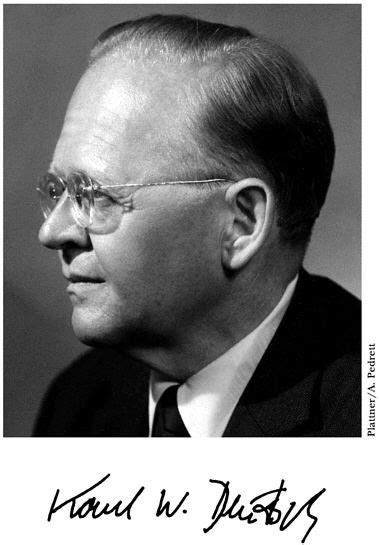A Quote by Elliott Sober
Darwin repeatedly used the hypothesis of common ancestry as a platform on which to build his various ideas about testing hypotheses concerning natural selection. He also argued that adaptive similarities provide little or no evidence for common ancestry. Although this second claim needs to be fine-tuned, Darwin was right that ample evidence for common ancestry can exist even if none of the characteristics we observe were caused to evolve by natural selection.
Quote Topics
About
Adaptive
Also
Although
Ample
Ancestry
Argued
Build
Caused
Characteristics
Claim
Common
Concerning
Darwin
Even
Evidence
Evolve
Exist
Fine
His
Hypotheses
Hypothesis
Ideas
Little
Natural
Natural Selection
Needs
None
Observe
Platform
Provide
Repeatedly
Right
Second
Selection
Similarities
Testing
Tuned
Used
Various
Were
Which
Related Quotes
Darwin and his successors have railed against the fallacy of confusing the current utility of a trait with the reason the trait evolved. For example, Darwin argued that skull sutures in mammals did not evolve because they facilitate live birth; the sutures were in place well before live birth evolved. Checking the chronological order in which different traits evolved in a lineage is one way to test an adaptive hypothesis; the fact of common ancestry is what makes that checking possible.
Natural Selection is not Evolution. Yet, ever since the two words have been in common use, the theory of Natural Selection has been employed as a convenient abbreviation for the theory of Evolution by means of Natural Selection, put forward by Darwin and Wallace. This has had the unfortunate consequence that the theory of Natural Selection itself has scarcely ever, if ever, received separate consideration.
The growth of our knowledge is the result of a process closely resembling what Darwin called 'natural selection'; that is, the natural selection of hypotheses: our knowledge consists, at every moment, of those hypotheses which have shown their (comparative) fitness by surviving so far in their struggle for existence, a competitive struggle which eliminates those hypotheses which are unfit.
For example, both humans and chimps have a broken copy of a gene that in other mammals helps make vitamin C. ... It's hard to imagine how there could be stronger evidence for common ancestry of chimps and humans. ... Despite some remaining puzzles, there's no reason to doubt that Darwin had this point right, that all creatures on earth are biological relatives.
We are inescapably the result of a long heritage of learning, adaptation, mutation and evolution, the product of a history which predates our birth as a biological species and stretches back over many thousand millennia... Going further back, we share a common ancestry with our fellow primates; and going still further back, we share a common ancestry with all other living creatures and plants down to the simplest microbe. The further back we go, the greater the difference from external appearances and behavior patterns which we observe today.
Now let me step back from the problem and very generally discuss natural selection and what we know about it. I think it is safe to say that we know for sure that natural selection, as a process, does work. There is a mountain of experimental and observational evidence, much of it predating genetics, which shows that natural selection as a biological process works.
Darwin's principle of natural selection leads to the prediction that the proper way to analyze any evolutionary development is to see the new features as adaptive to environments. And that's a perfectly good principle. The problem is that there are many evolutionary biologists who view everything that happens in evolution as directly evolved for adaptive benefit. And that just doesn't work. Whenever you build a structure for adaptive reasons, the structure is going to exhibit properties that have nothing to do with adaptation. They're just side consequences.





































